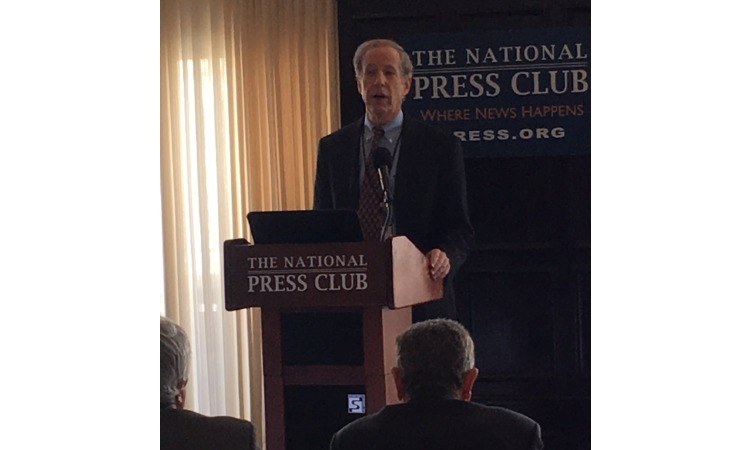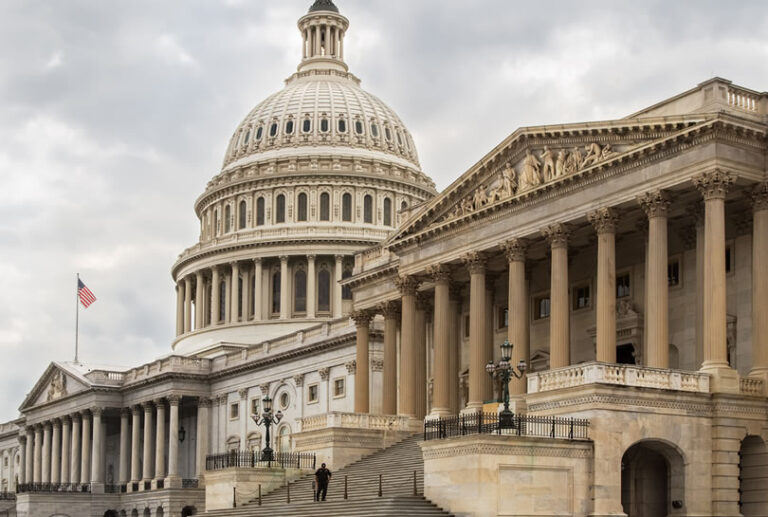Jan. 7, 2019 – As the new members of Congress get to work in a now-divided government, the healthcare communications industry needs to remain engaged and vigilant, warns Coalition for Healthcare Communication Executive Director Jon Bigelow.
Although Wall Street seems to think that a divided government – with the House and Senate controlled by different parties – is good for the pharmaceutical industry, “I would say the answer to that question is: don’t bet on it,” said Bigelow, who spoke at the Coalition’s 2018 Post-election Conference on Healthcare Policy late last year in Washington, D.C. “There are a number of specific concerns for the healthcare communications industry and definitely concerns for the pharmaceutical industry.”
Bigelow asserted that industry needs to have a voice in the discussions around such hot topics as drug pricing, data privacy, FDA issues, tax issues and deregulation. “There’s an adage here in Washington, that if you are not at the table, you are on the menu,” he said.
With healthcare considered the number one voter concern in the midterm elections, it seems that a focus on this issue will continue, especially as a Republican Senate and White House push for such drug price transparency measures as reducing roadblocks to generics and biosimilars, putting list prices in drug TV advertising, and utilizing the international pricing index for Medicare Part B under a sizable “demonstration project.” According to Bigelow, “it is important to note for those of us in this room that if pharma profits diminish, it is very possible that pharma promotion diminishes.”
Further, the Democrat-controlled House is likely to hold hearings on drug pricing and call prominent industry members to testify, try to negotiate Medicare Part D prices, and push for a variety of proposals – e.g., prohibiting “pay for delay,” stripping patent rights for “excessively priced” drugs and banning direct-to-consumer (DTC) ads in the first three years after approval – that were unlikely to pass in the last Congress, according to Bigelow.
Outside of drug pricing, industry should expect action in 2019 on data privacy and marketing amidst building anger about data hacking, misuse of data and intrusive ads. The European Union’s recent General Data Protection Regulation expands the definition of personal data, allows for greater consumer consent, including opt-in, and levies severe penalties for breaches, and the state of California has established its own privacy provisions under the California Consumer Privacy Act, which could begin a wave of other state actions.
“The last thing industry wants is to have to follow 50 different sets of rules for 50 different states. This, too, will have an impact on pharmaceutical marketing and communications,” Bigelow told CHC conference attendees.
At the FDA, Bigelow noted that FDA Commissioner Scott Gottlieb, M.D., is methodically moving forward with his agenda, such as:
- Promoting a strong pace for drug approvals;
- Taking special approaches in key areas (e.g., antibiotics);
- Improving clinical trial design;
- Enforcing “off-label” in subtler ways; and
- Conducting research on clearer risk presentation in DTC ads.
On the tax front, although the pharmaceutical industry has dodged the elimination of the ad tax deduction in the past, it could re-emerge in 2019. “The reality is that the pharmaceutical industry could be a big target, and pharmaceutical marketing could be a big target,” Bigelow stated. Because Congress will be looking for bills that can move quickly, “one ‘shovel-ready’ way of gaining income in the federal government is the proposal that’s bounced up and down several times to remove the deductibility of marketing expenses for pharmaceutical products,” he said. “It’s something else we need to be watching for this year.”
Finally, in the Trump administration’s continued push for deregulation, there could be changes made to regulations that have posed burdens on the industry. For example, the Centers for Medicare & Medicaid Services (CMS) is revisiting the Sunshine Act’s inclusion of medical textbooks and reprints as transfers of value. “There is a real opportunity here that rules will be changed to omit that requirement,” Bigelow said, noting that the Coalition did submit comments in response to a CMS “request for information” on this matter.
So what should the healthcare communications industry do to keep track of all of these moving parts? Bigelow advised that industry professionals need to state their value to the healthcare system and the emphasis being put on ethical, accurate work. “Do not assume it is understood by everyone,” Bigelow said. “It is not. Do not assume that it makes no difference whether people understand it. It absolutely does. And do not assume other people will speak up for us … we have to speak up for ourselves,” he said.
Additionally, healthcare communicators have to be proactive about communicating innovations to healthcare professionals and patients, and they need to let Washington hear their voices, Bigelow explained. They also need to be truthful, transparent and alert as the healthcare environment shifts and public perception changes. But they also should be proud, Bigelow said. “There is a lot to be proud of in the important work that we do, but we need to get that message out.”




